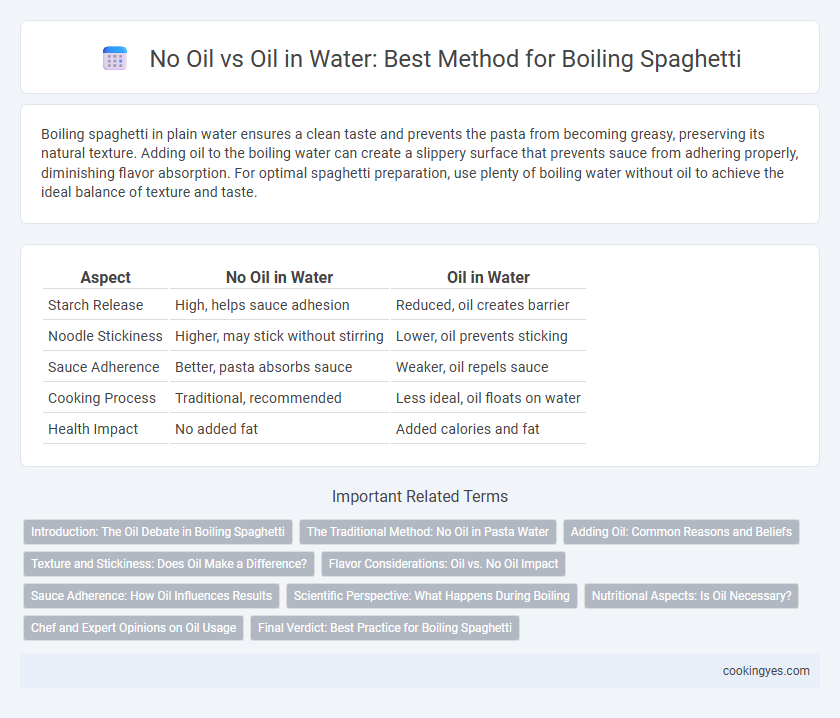Boiling spaghetti in plain water ensures a clean taste and prevents the pasta from becoming greasy, preserving its natural texture. Adding oil to the boiling water can create a slippery surface that prevents sauce from adhering properly, diminishing flavor absorption. For optimal spaghetti preparation, use plenty of boiling water without oil to achieve the ideal balance of texture and taste.
Table of Comparison
| Aspect | No Oil in Water | Oil in Water |
|---|---|---|
| Starch Release | High, helps sauce adhesion | Reduced, oil creates barrier |
| Noodle Stickiness | Higher, may stick without stirring | Lower, oil prevents sticking |
| Sauce Adherence | Better, pasta absorbs sauce | Weaker, oil repels sauce |
| Cooking Process | Traditional, recommended | Less ideal, oil floats on water |
| Health Impact | No added fat | Added calories and fat |
Introduction: The Oil Debate in Boiling Spaghetti
Boiling spaghetti in water without oil preserves the pasta's surface texture, allowing sauce to adhere better and enhancing flavor absorption. Adding oil creates a thin barrier on the water's surface, which can prevent the water from foaming but also causes the pasta to be slippery, reducing sauce clinging. Most chefs recommend omitting oil to achieve optimal sauce integration and authentic spaghetti texture.
The Traditional Method: No Oil in Pasta Water
Boiling spaghetti without oil preserves the pasta's natural starchy surface, allowing sauces to adhere more effectively for enhanced flavor and texture. Traditional Italian cooking emphasizes using only salted water to maintain the authentic taste and prevent slippery pasta, which can occur if oil is added. This method also ensures the water doesn't become greasy, avoiding a heavy film on the pasta that can dilute sauce integration.
Adding Oil: Common Reasons and Beliefs
Many cooks add oil to boiling water for spaghetti to prevent noodles from sticking together and to reduce foaming during cooking. However, adding oil can create a slippery surface on the pasta, which may hinder sauce absorption and affect texture. Scientific tests show that stirring and using adequate water volume are more effective methods to keep spaghetti strands separate without impacting flavor or sauce adherence.
Texture and Stickiness: Does Oil Make a Difference?
Boiling spaghetti without oil results in pasta that retains a firmer texture and allows sauces to adhere better due to the natural starches released during cooking. Adding oil to the boiling water creates a slippery surface on the pasta, reducing stickiness but potentially preventing sauces from clinging effectively. For optimal texture and sauce absorption, cooking spaghetti in plain salted water is preferred.
Flavor Considerations: Oil vs. No Oil Impact
Boiling spaghetti without oil allows the pasta to absorb the water's natural flavors, preserving the sauce's intended taste and texture. Adding oil to the boiling water can create a slippery surface on the spaghetti, preventing sauce from adhering properly and diminishing overall flavor integration. Chefs often prefer no oil to maintain optimal flavor absorption and ensure a more cohesive pasta dish.
Sauce Adherence: How Oil Influences Results
Adding oil to boiling water when cooking spaghetti creates a thin film on the pasta surface that reduces its stickiness, leading to less sauce adherence. Without oil, the starches released during boiling help the sauce cling better to the spaghetti strands, enhancing flavor integration. Optimal sauce adherence occurs when pasta is cooked in plain water and then immediately combined with sauce, ensuring maximum coating and taste absorption.
Scientific Perspective: What Happens During Boiling
Boiling spaghetti in water without oil allows starch granules to hydrate and gelatinize uniformly, resulting in better pasta texture and absorption of flavors. Introducing oil forms a hydrophobic layer that can inhibit water-pasta contact, reducing starch release and potentially causing slippery noodles that resist sauce adherence. Scientific studies show that skipping oil enhances the cooking process by promoting optimal heat transfer and starch diffusion, crucial for ideal spaghetti consistency.
Nutritional Aspects: Is Oil Necessary?
Adding oil to boiling water when cooking spaghetti is not necessary for nutritional purposes and does not improve the pasta's health benefits. Oil can create a slippery surface on the spaghetti, potentially reducing sauce adherence without impacting macronutrient content or caloric value. Cooking spaghetti in plain water maintains its natural carbohydrate profile while avoiding added fats that do not enhance nutritional value.
Chef and Expert Opinions on Oil Usage
Chefs and culinary experts widely agree that adding oil to boiling water for spaghetti is unnecessary and can hinder sauce adhesion. They emphasize using plenty of salted water instead, as oil creates a slippery surface that prevents sauces from properly clinging to the pasta. Professional recommendations focus on stirring frequently during cooking to avoid sticking rather than relying on oil in the water.
Final Verdict: Best Practice for Boiling Spaghetti
Boiling spaghetti in water without oil prevents the pasta strands from becoming slippery, allowing sauce to adhere better for enhanced flavor absorption. While adding oil to boiling water can reduce foam and prevent sticking, it often creates a barrier that hinders sauce adherence, negatively impacting the dish's texture and taste. The best practice is to reserve oil for the sauce or finishing touch, ensuring perfectly cooked spaghetti that integrates seamlessly with its sauce.
No oil vs oil in water for boiling spaghetti Infographic

 cookingyes.com
cookingyes.com